2018
2018 was a full year of clinical practice
During 2018, Drs Raju and Prakash have done well with their first full year in a fairly stable practice – with all the busyness that junior staff experience!
Mar 3 2018
Raju has been an accomplished representative for rehabilitation medicine. He was interviewed on Kathmandu television by senior journalist and former BBC World Service broadcaster Suman Kharel.
Mar 12 2018
Kathmandu airport is a challenge for pilots descending into the valley. A horrendous crash of a plane from Bangladesh occurred on this date for reasons discussed in Wikipedia, relating to pilot disorientation and poor communications with the flight crew. 52 people died including a senior Nepali neurosurgeon and 12 recently graduated physicians returning home.
Mar 24 2018
SpiNepal friend Kate Coffey held a fundraiser on Bowen Island for the Spinal Cord Injury Network developed by SIRC peer counsellor Rishi and colleague Keshav Thapa. The proceeds were to support their residential program (the proposal here.)
Apr 2018
SIRC celebrated its 16th year of operation. Raju noted that SIRC was busy with the daily census in the 65-70 range. He described a good working relationship with the SIRC board members and the two house doctors were working out well. Raju and Prakash presented at the annual meeting of NESON, the Nepalese neurosurgeons’ professional association. Raju described the contemporary bladder management protocols after SCI,and Prakash presented his experience with craniocervical injuries.
Prakash was working at Mediciti hospital in Kathmandu with Dr. Sharma, his former chief of service at Bir Hospital. He has a good and collegial colleague and two junior registrars. The work load has been satisfying: 26 OR cases in the most recent month.
Plans were in hand for the visit of Vancouver emergency physician Dr Joanna Mereu, who for a number of years was the hospitalist on the SCI service at Vancouver’s GF Strong Rehabilitation Centre (and was one of the Vancouver group that Skyped with Raju after the 2015 earthquake).
On the home front, Prakash and Laxmi added a daughter to their family. Raju and his extended family moved into long-awaited new accommodation.
May 30 2018
Raju was invited to join the editorial board developing a consumer module for ISCoS’s E-learn SCI teaching resource. He was also invited to participate in an injury prevention workshop in India. With good coverage on TV and radio in Nepal, he feels that this will be helpful in a number of ways, enhancing awareness of SCI in Nepal, with respect to injury prevention and the image of rehabilitation generally.
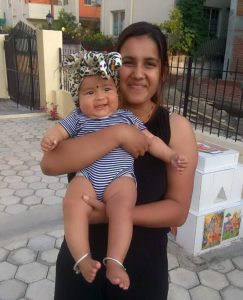 Sheela, Raju‘s wife, (right, with Evani) assumed her responsibilities in a new job with the Karuna Foundation Nepal, to develop a CBR training package for the disabled. Raju was aware that the Dhulikhel Hospital Spine service may initiate a spine fellowship and hoped to have input into their training curriculum so that the needs of the newly cord-injured person are adequately addressed, and so that newly-trained spine surgeons entering practice can implement the necessary precautions to minimize some of the life-threatening complications still developing at the acute centers.
Sheela, Raju‘s wife, (right, with Evani) assumed her responsibilities in a new job with the Karuna Foundation Nepal, to develop a CBR training package for the disabled. Raju was aware that the Dhulikhel Hospital Spine service may initiate a spine fellowship and hoped to have input into their training curriculum so that the needs of the newly cord-injured person are adequately addressed, and so that newly-trained spine surgeons entering practice can implement the necessary precautions to minimize some of the life-threatening complications still developing at the acute centers.
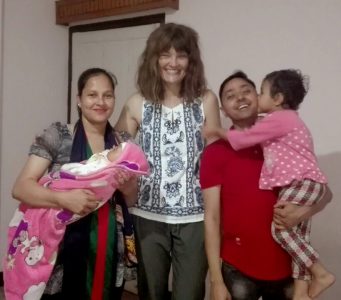 Our colleague Dr Joanna Mereu returned to Vancouver May 20th after a month spent working with Dr Raju at SIRC. Her background as a trained family physician with seven years of experience as a hospitalist on the Spinal Cord Injury service at Vancouver’s GF Strong Rehabilitation Centre was very useful as she worked alongside and taught Dr Raju and the two SIRC doctors. During the work week she stayed in the historic town of Bhaktapur, part way between Kathmandu and Bhainsepati village where SIRC is situated. She commuted to work on the SIRC bus, and at weekends visited Raju and Sheela at their new home, visited Dr Christine Groves and her roommate (another emergency physician) in Lalitpur and was also able to visit Prakash and his expanding family (left). She overlapped with the visiting Swiss team from Nottwil’s Swiss Paraplegic Centre who work extensively with the multidisciplinary team on their periodic visits .
Our colleague Dr Joanna Mereu returned to Vancouver May 20th after a month spent working with Dr Raju at SIRC. Her background as a trained family physician with seven years of experience as a hospitalist on the Spinal Cord Injury service at Vancouver’s GF Strong Rehabilitation Centre was very useful as she worked alongside and taught Dr Raju and the two SIRC doctors. During the work week she stayed in the historic town of Bhaktapur, part way between Kathmandu and Bhainsepati village where SIRC is situated. She commuted to work on the SIRC bus, and at weekends visited Raju and Sheela at their new home, visited Dr Christine Groves and her roommate (another emergency physician) in Lalitpur and was also able to visit Prakash and his expanding family (left). She overlapped with the visiting Swiss team from Nottwil’s Swiss Paraplegic Centre who work extensively with the multidisciplinary team on their periodic visits .
Joanna was impressed with the work being done at SIRC and with the warmth and kindness of the staff, but noted that largely-preventable pressure sores arising in the acute care hospitals continued to be a major problem for people with new injuries. The relationship between the rehab service at SIRC and the surgeons in the acute centres continues to be critical to address this problem. She made some logistical suggestions to the admin staff and the hospital board supportive of Raju restructuring the working environment to most efficiently use his and his assistant’s time and skills. Joanna also made constructive suggestions regarding bladder care, management of spasticity and aspects of pressure sore management.
September 5th 2018 (Spinal Cord Injury Day)
Spinal Cord Injury Day, to be celebrated annually on September 5, was inaugurated by the International Spinal Cord Society (ISCoS) to increase international awareness of SCI by the general public and to focus on injury prevention. The theme this year was simple: “Stop Spinal Cord Injury“. Dr Raju just returned from New Delhi following a three-day workshop addressing the need for enhanced SCI prevention programs in India and the other South Asian countries who participate in the Asian Spinal Cord Network (ASCoN). Prevention is an important responsibility of any SCI program, and the principles outlined in the previous ASCoN guidelines booklet are being updated. The previous ASCoN prevention guide can be found here
Spinal Cord Injury Network Nepal (SCIN) was established in 2015 by 7 people with spinal cord injury (SCI), the particular brainchild of Rishi Ram Dhakal, one of the team of peer counsellors at SIRC since 2009. It is a nonprofit, social organization providing peer support and has been registered appropriately in Nepal. Currently, their major project is the independent living “practice home”.
The practice home allows young persons with SCI from economically weak families to complete their education up to grade 12 in a safe, supportive and accessible environment providing “a home away from home“. Once young people with SCI return home to their villages, the inaccessible environment can make it impossible to continue education, isolating young people both from their friends and the opportunity to learn. SCIN Nepal obtained a five room apartment in March 2016 to provide a home for seven children with SCI, including five males and two females. A caretaker was hired and a small office set up. They have managed with donations from individuals, including donations-in-kind of food, equipment and some furnishings.
Spine Nepal became aware of SCIN through our friend Kate Coffey of Bowen Island, who stated that “SCIN emphasizes that these young people with SCI have not been abandoned by their families but are loved and cherished by their families who recognize that the practice home provides the only opportunity for the children to continue their education and become independent and active adults. Families do contribute financially, according to their means. Admission is possible for young people, age 8-20, whose education to grade 12 is incomplete and who are from financially challenged families living in a remote area. They have to be able to care for themselves, to be willing to study and to contribute to their community.”
As Kate said on her blog in May: “The hostel has basic accommodation, spotlessly clean and well cared for by a hired Didi – a local lady who cooks and cleans for the children, and gets them off to school in the morning. Didi actually means Older Sister in the Nepali language. I think it is fitting that the lady that cares for them is indeed like their older sister in their home away from home.” For more information please refer to Kate’s initial description of the work of SCIN here and her most recent updates from this summer here and here.
One of our donors had requested that funding be directed to the support of SCIN. Spine Nepal sees the SCIN mission as being complementary to the work that we and SIRC undertake. Dr. Raju has himself grown up in a similar environment, and supported the mission of this nonprofit affiliate of SIRC. We reviewed the income and expense statements for SCIN for the early part of this year and were impressed by the care and thoroughness that Rishi and administrator Keshav brought to this work.
October 13th 2018 (Asian Paralympics)
The Nepal Paralympics team (including some of our friends from SIRC) competed in the 2018 Asian Paralympics in Jakarta, Indonesia. Below – Front row: Keshav (first left), Sonika (second left) and Dolma (last right). Thanks Kate for bringing this to our attention on your blog.
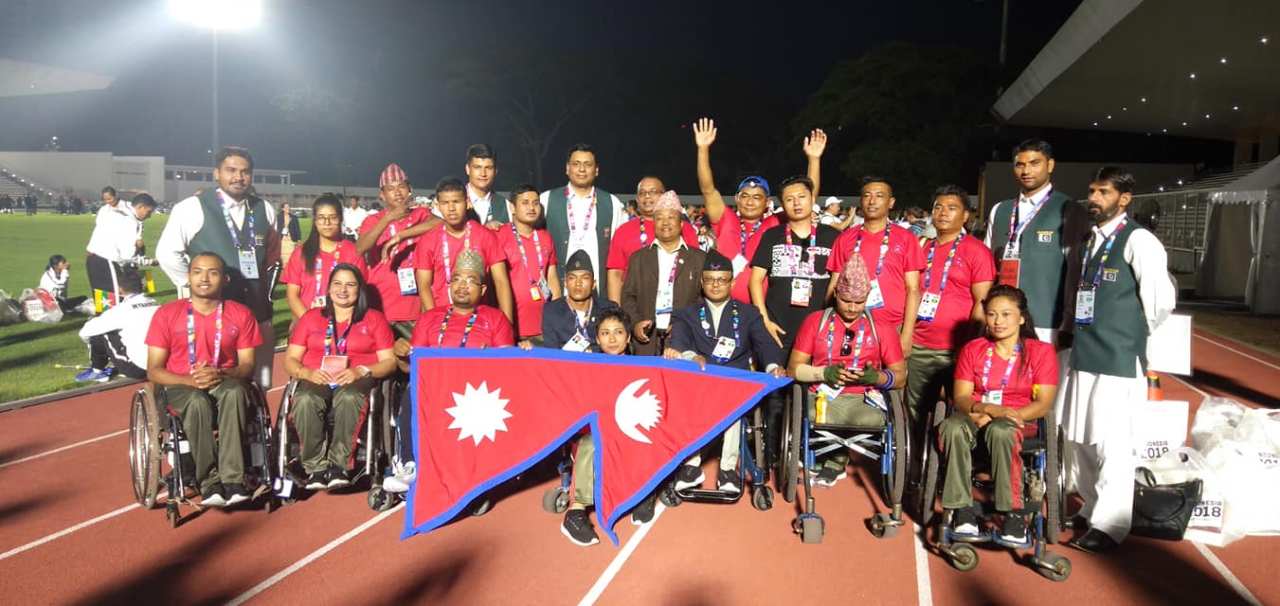
November 7th (Diwali and Tihar)
Kathmandu’s Tihar 5 day festival is Nepal’s extended version of Diwali, second only to the annual Dashain festival. Each day of the festival has a specific function – beginning with the day of the Dog. In India, Diwali again caused tremendous increase in the pollution in New Delhi: One research group, Urban Emissions, estimated five million kilograms of fireworks had been burst (according to the Guardian).
November 8-11 2018 (Annual ASCoN meeting in Yangon, Myanmar)
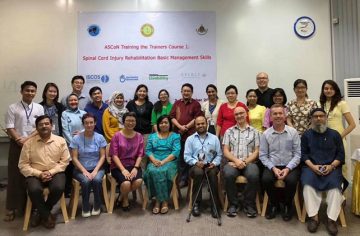 The Asian Spinal Cord Network (ASCoN) is the regional affiliate of the International Spinal Cord Society (ISCoS) that provides support for SCI care systems throughout the region. The members provide a lot of mutual support and share their experiences at the annual meeting which was linked this year with a preliminary five day “Training the Trainers” course (right), taught primarily by Dr Apichana Kovindha from Chiang Mai, Thailand, a superb teacher. 10-12 rehabilitation physicians experienced with SCI and potential leaders in their hospital or country were sponsored to attend the course.
The Asian Spinal Cord Network (ASCoN) is the regional affiliate of the International Spinal Cord Society (ISCoS) that provides support for SCI care systems throughout the region. The members provide a lot of mutual support and share their experiences at the annual meeting which was linked this year with a preliminary five day “Training the Trainers” course (right), taught primarily by Dr Apichana Kovindha from Chiang Mai, Thailand, a superb teacher. 10-12 rehabilitation physicians experienced with SCI and potential leaders in their hospital or country were sponsored to attend the course.
Raju was also invited to present in an ASCoN panel discussion on “SCI Rehabilitation: How to overcome the challenges”, joined by others from Myanmar, Malaysia, Bangladesh, Sri Lanka, Indonesia, Philippines and Thailand. Raju’s participation on this program was jointly sponsored by the organisers and SpiNepal. We also provided some support to SIRC physio Prakriti Khatri, working with SIRC supporter and physiatrist Dr Christine Groves. Their abstract “Spinal Cord Independence Measure III outcomes among individuals with complete spinal cord injury in Nepal” was accepted for presentation at ASCoN.
Thanks to Dr Jordan Farag for sending to us a recent “Physiatry Forward”, the newsletter of the Association of Academic Physiatrists. Look for page 4 through this link to read a delightful interview with Dr Christine Groves (right), Raju’s mentor and colleague in Kathmandu who has been a great support to SIRC over the last three years.
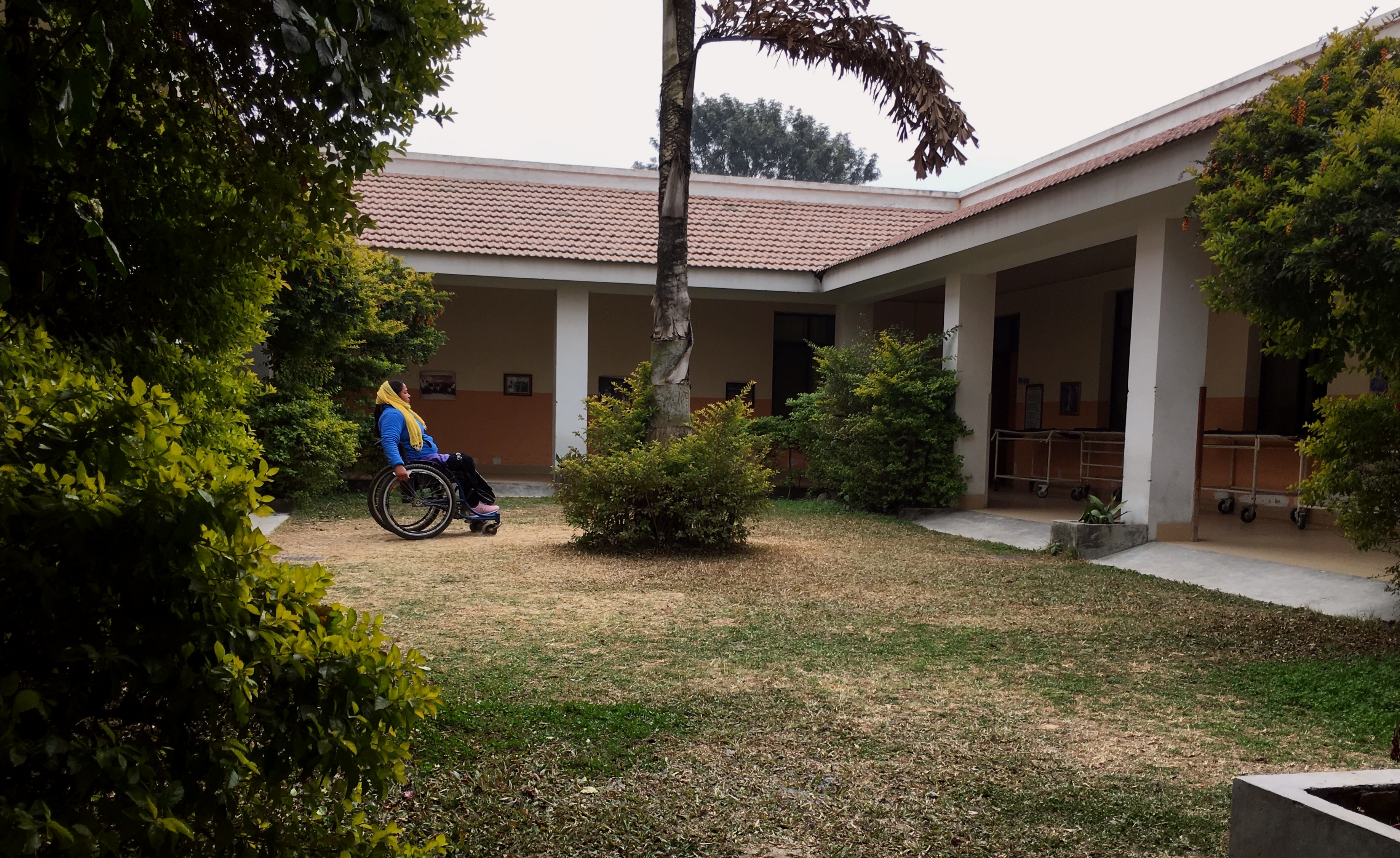
Above: a patient at SIRC wheels across the courtyard after lunch – Dec 2018
December 23 2018 (Christmas in Kathmandu)
We spent three weeks in Kathmandu at the start of our tenth year of working with SIRC and others here in the Spine care community. So much has happened since our first meeting with the dedicated people at SIRC, many now friends. SIRC has changed, expanded and matured, from 15-20 patients with SCI on our first visit to some 70 now, still mostly with SCI but with some folks recovering from brain injury or stroke.
The clinical team had, over the last couple of years, trained some 400 health and allied workers about rehab in SCI and, funded by an Australian embassy grant, had travelled to Chitwan in southern Nepal to conduct a training course.. The grant was sufficiently generous that Raju and his team arranged two further 3-day hands-on back to back workshops in the Kathmandu region which we were able to join. With no charge for attendance, and two free meals daily included, these two recent workshops attracted middle level to senior level care staff – physicians, nurses, and physiotherapists for a total of about 60 attendees from about 20 health care institutions. Founding executive director Esha opened the first workshop on behalf of Spinal Injury Sangh Nepal (the Foundation); Founding Board Chair Kanak Mani Dixit opened the second with a passionate account of his early conviction that the poorer people of Nepal had need of a hospital that could provide affordable care to those with SCI. The General Secretary of the Association of Spine Surgeons of Nepal, Prof Dr Rabindra Pradhan, spoke of how vital spine surgeons now find the service from SIRC.
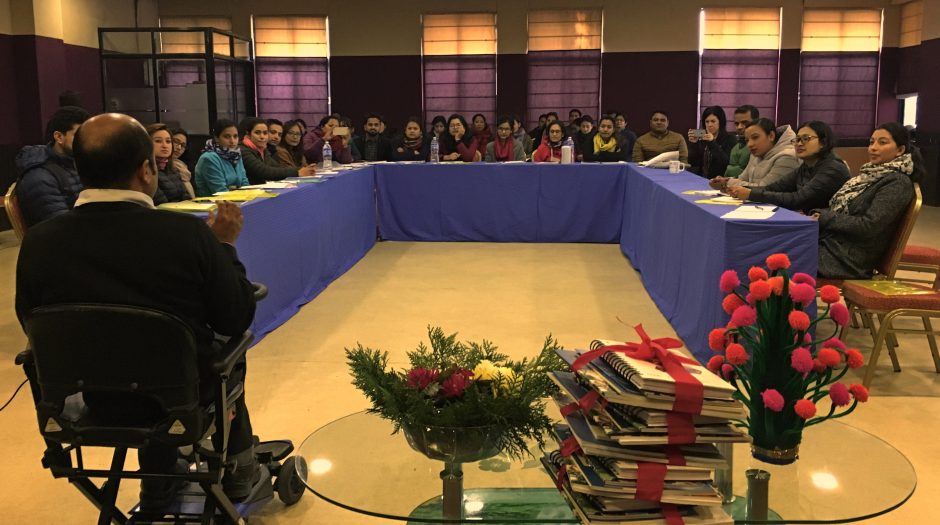
We joined our friend, physiatrist Christine Groves, living in Kathmandu and now in her fourth year supporting SIRC, to present talks on the consequences and complications of SCI and the care of SCI patients and local spine surgeons outlined their approaches to the role of spine surgery in the acute setting.
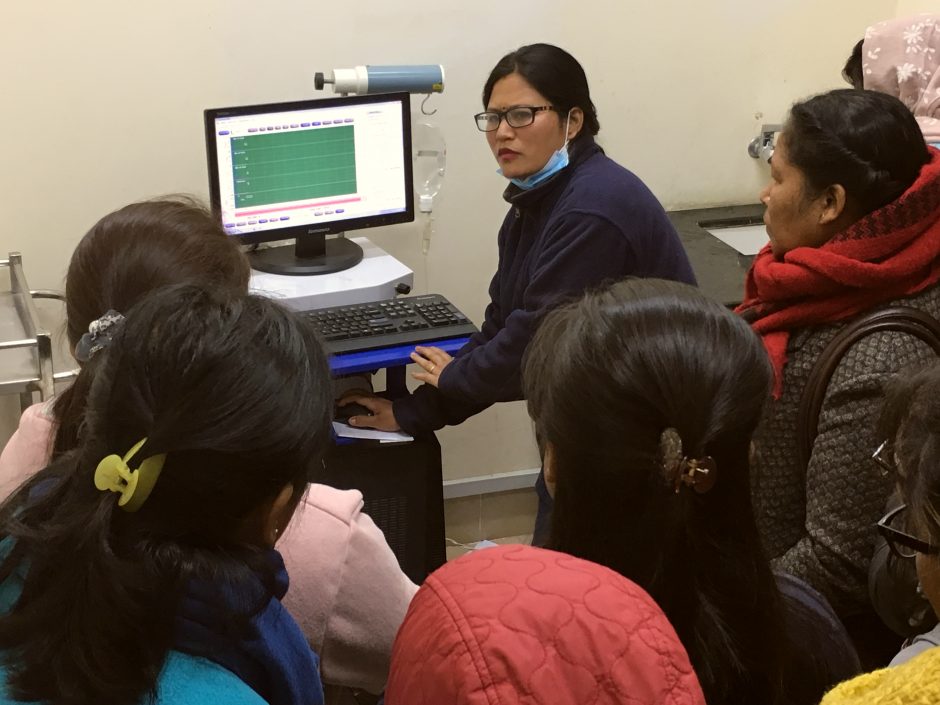
The lion’s share of the teaching was from Dr. Raju (teaching above) and the SIRC staff who gave talks on skin and bowel care, urologic management including urodynamic monitoring (left), sexuality, management options for the tetraplegic hand, psychological issues and disability rights. (SIRC now had 3 urodynamic-trained nurses doing 4/5 urodynamic cases weekly, with weekly urologic/urodynamic rounds supported by a Dhulikel-based urologist. In the workshops, Raju enthusiastically led a discussion of bladder management including catheter techniques. After explaining the basis of urodynamic assessment, the group went up to the urodynamic lab.
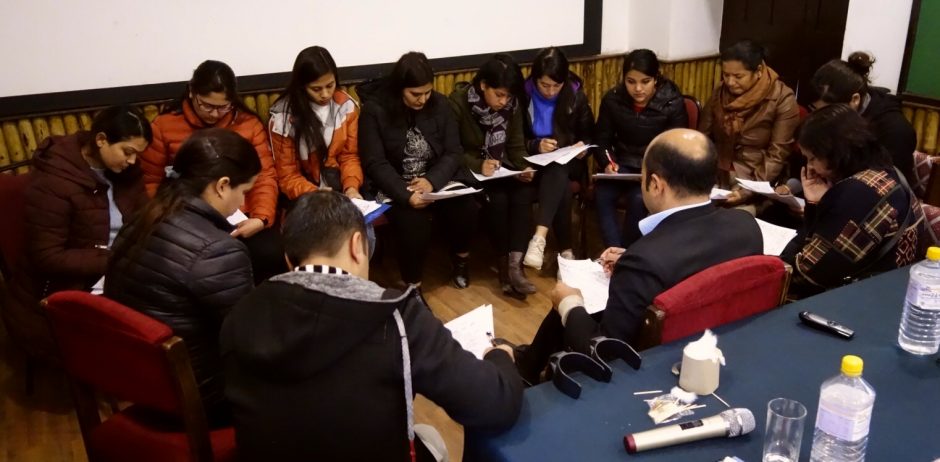
The need for use of the International Neurological Standards was explained and taught by staff (Raju with one group, right) and was practiced by course attendees. The participants were also involved in hands-on demonstrations of safe extrication, positioning and transfer techniques, intermittent catheterization and wheelchair use. Raju and the other SIRC presenters taught with professional polish appropriate to any international meeting, moving easily between Nepali and English. Also bilingual, Christine contributed to the overall high caliber of the workshops.
Helping cord-injured children: the Spinal Cord Injury Network
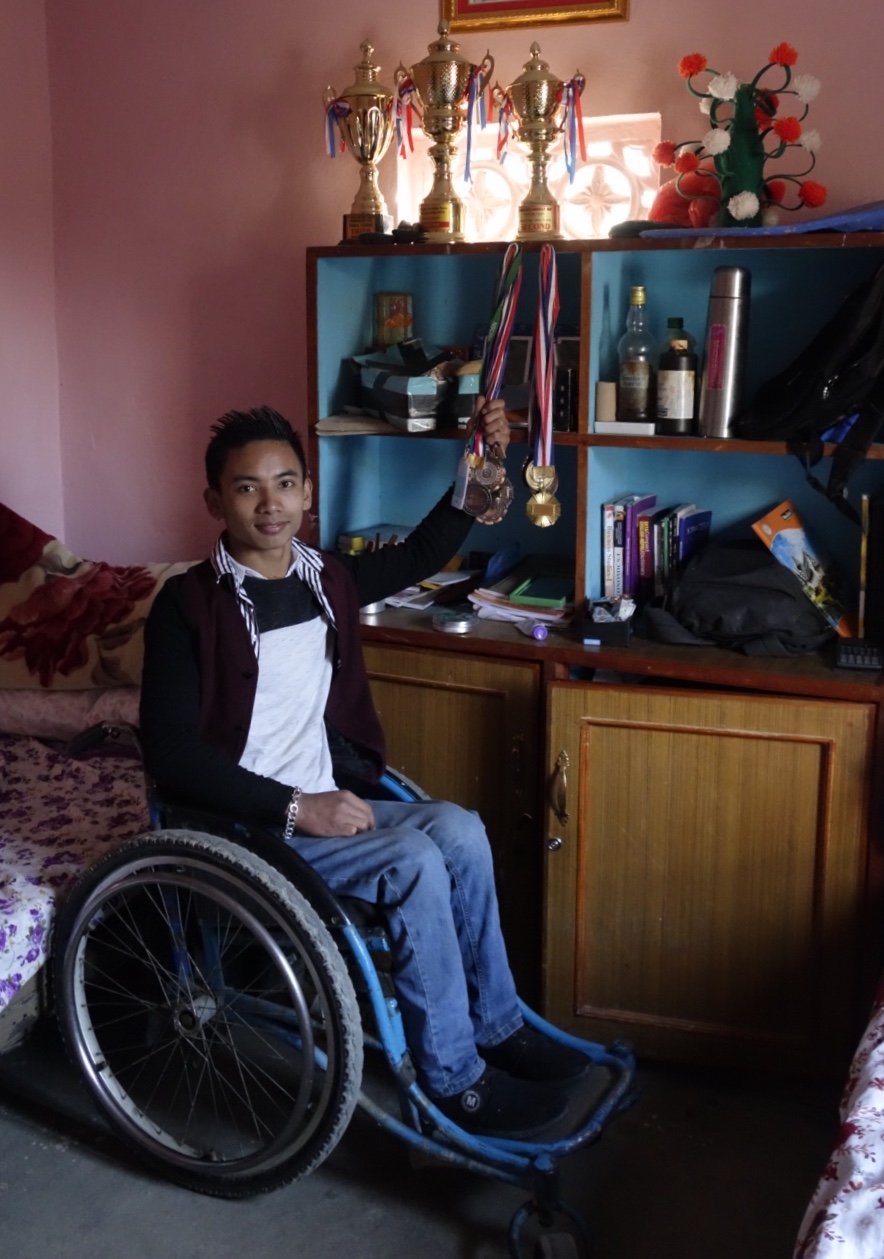
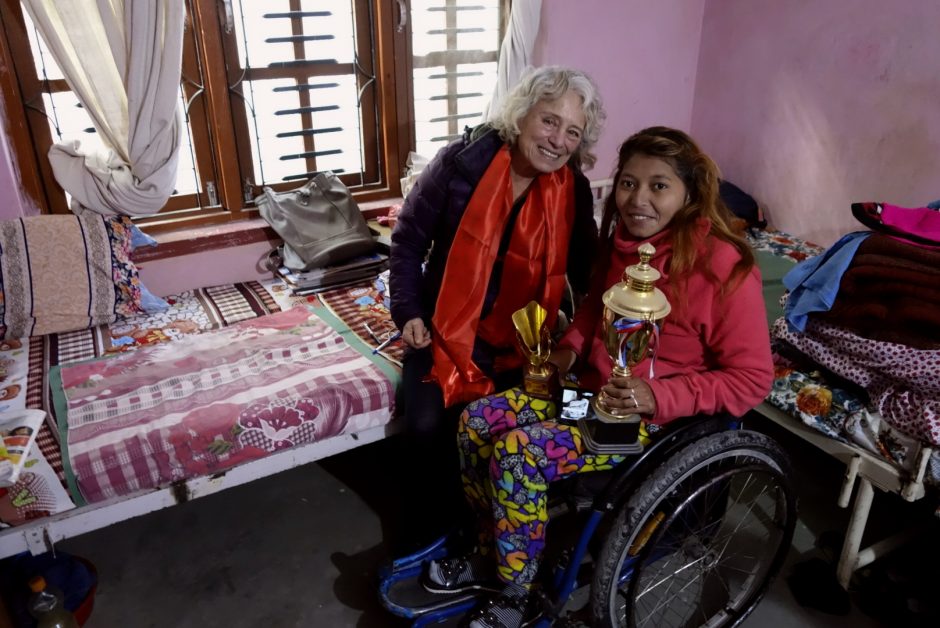
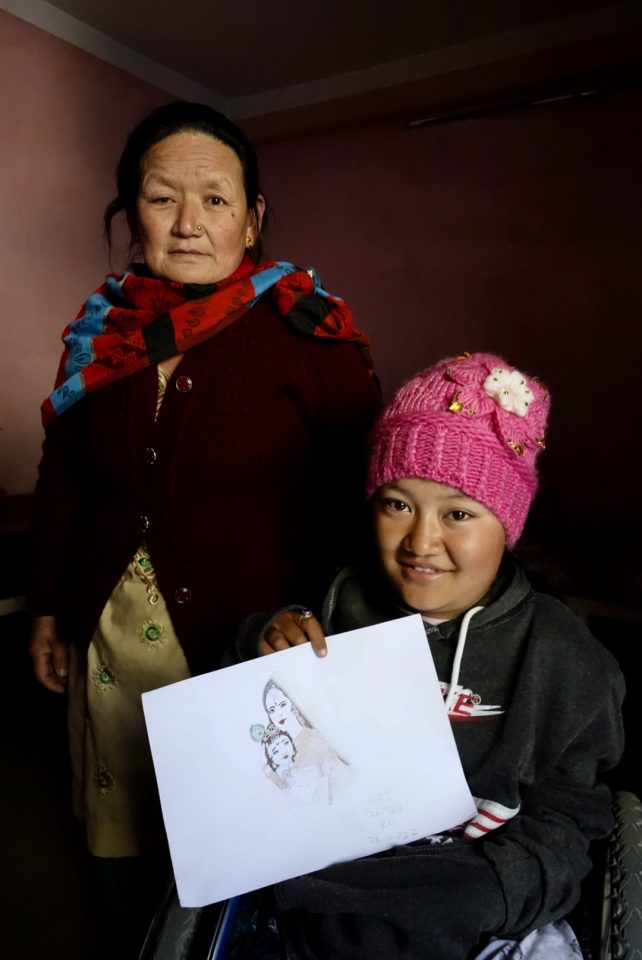
On this trip we visited the twin hostels of the Spinal Cord Injury Network, accommodating now up to 15 children with SCI (for background please see the Sept entry above) .
Founder Rishi, one of SIRC’s peer counsellors, and manager Keshav are justifiably proud of the work which provides children with SCI a stable home from which they continue their education through high school. Here are the stories of three of the students we met:
Laxman, 21, above left, from Dading fell from a tree about 5 years ago and is paraplegic. In grade 12 he was interested in Uni, with possible sponsorship by a German group. He is a table tennis and basketball champ.
Sangita, 21, above centre, had non-traumatic spinal cord weakness but was still able to walk. sadly, surgery 2.5 years previously left her paraplegic. In grade 11, she was also hoping to go to university; she was also a table tennis champion.
Sumala, above right and now 11, fell as a child and apparently had surgery then. With recent skin pressure problems, she was in the SCIN hostel for a couple of weeks before being admitted to SIRC. Right hand dominant, she could draw and paint with considerable artistic talent.
In accordance with SpiNepal`s mission to support education initiatives which improve the lives of people in Nepal with SCI, and at the request of one of our donors, we sent funds to the SCIN, hoping to provide further support as we learn more about their work.
SIRC continued to work largely without official operations funding, and cares for the most importune patients. Limited government funding did not fully support the necessary care components of SCI patients (acute care, implants, drugs, rehab care and equipment, and home modification), and, as auto insurance was a recent concept, it added little to the pot. SIRC administration was studying options to meet the needs of better-funded clientele who could pay for care and is exploring other ways of generating revenue. Administrative director Hari (we would call him the chief operating officer), new this year, impressed us and was working well with Raju.